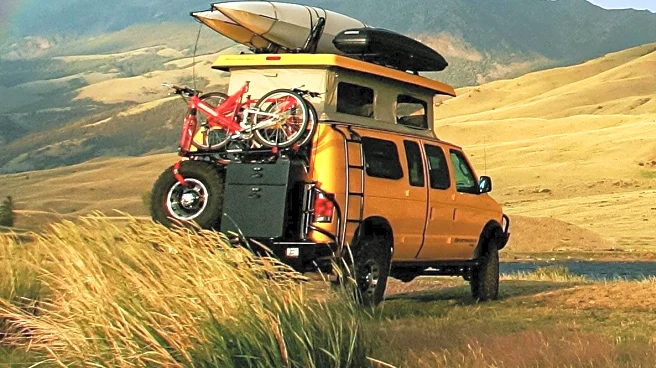What is the story about?
What's Happening?
The travel industry is witnessing a new trend known as 'extreme day trips,' where travelers fly to a destination, engage in a series of activities, and return home all within a single day. This concept has gained popularity on social media platforms like TikTok and Facebook, with thousands of posts and a dedicated group boasting over 327,000 members. Tour operator Tui has capitalized on this trend by launching an extreme day trip to Lapland for its winter 2026 program, offering a packed itinerary that includes sleigh rides, snowmobile trips, and meeting Santa Claus. Despite the excitement surrounding these trips, they have raised concerns about their environmental impact, particularly the carbon emissions associated with frequent flying.
Why It's Important?
The rise of extreme day trips highlights a shift in consumer behavior towards fast-paced, high-intensity travel experiences. While these trips offer a unique way to explore destinations quickly, they pose significant environmental challenges. Aviation is a major contributor to global CO2 emissions, and the increase in short-haul flights exacerbates this issue. The trend underscores the need for sustainable travel practices, as frequent flying contradicts efforts to reduce carbon footprints. The travel industry faces pressure to balance consumer demand for quick adventures with the imperative to minimize environmental impact, prompting discussions on sustainable tourism and responsible travel.
What's Next?
As extreme day trips gain traction, stakeholders in the travel industry may need to address the environmental concerns associated with this trend. Tour operators could explore alternative, eco-friendly travel options or promote longer stays that benefit local economies and reduce carbon emissions. Additionally, advancements in aviation technology, such as low-emission aircraft, could play a crucial role in mitigating the environmental impact of frequent flights. The industry might also see increased advocacy for sustainable travel practices, encouraging travelers to consider the ecological footprint of their adventures.
Beyond the Headlines
The popularity of extreme day trips reflects broader societal trends, including the desire for instant gratification and the impact of social media on travel choices. This trend raises ethical questions about the sustainability of such travel practices and the responsibility of travelers to consider the environmental consequences of their actions. It also highlights the cultural shift towards valuing experiences over material possessions, as people seek memorable adventures that can be shared online. The travel industry may need to adapt to these changing consumer preferences while promoting responsible and sustainable tourism.
















